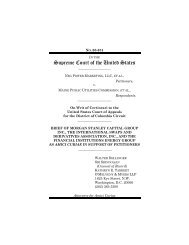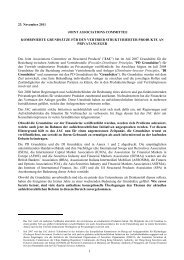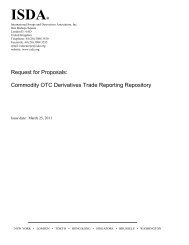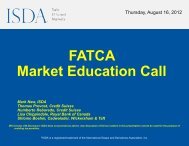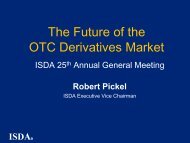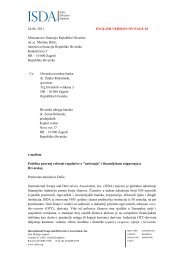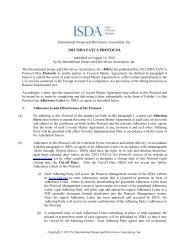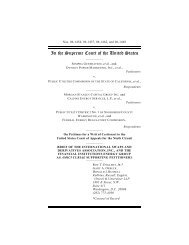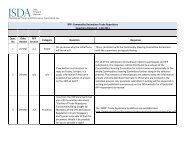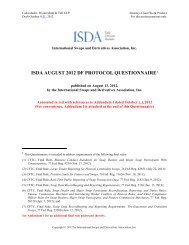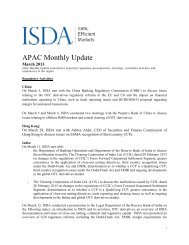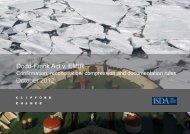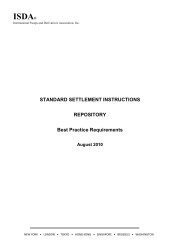Global Regulatory Update - ISDA
Global Regulatory Update - ISDA
Global Regulatory Update - ISDA
You also want an ePaper? Increase the reach of your titles
YUMPU automatically turns print PDFs into web optimized ePapers that Google loves.
<strong>Global</strong> <strong>Regulatory</strong> <strong>Update</strong><br />
April 20, 2011<br />
<strong>Global</strong> <strong>Regulatory</strong> <strong>Update</strong> tracks legislative and regulatory activities in the jurisdictions in which <strong>ISDA</strong><br />
maintains a presence.<br />
UNITED STATES<br />
Heat intensifies against Dodd-Frank in DC<br />
Congressional Republicans concerned with the speed and breadth of the rulemakings implementing Title VII<br />
of the Dodd-Frank Act have introduced legislation that would extend the effective date of the Act and<br />
implementing regulations for 18 months or more, with several exceptions for promulgation of key<br />
definitions and data reporting requirements. The legislation, which was offered by the Chairmen of the<br />
House Financial Services and Agriculture Committees and the Chairmen of the General Farm Commodities<br />
and Capital Markets Subcommittees, would also require the CFTC and SEC to engage in fulsome costbenefit<br />
analyses of the rules and would provide the agencies with limited exemptive authority.<br />
Separately, Rep. Grimm (R-NY) has offered legislation that would refine the definition of end-user in an<br />
attempt to provide additional certainty to commercial end-users, particularly with respect to the margin<br />
requirements.<br />
Also, the CFTC Inspector General responded earlier this week to a Congressional inquiry into the CFTC's<br />
cost-benefit analyses of its Dodd-Frank proposals by concluding that the Commission has not sufficiently<br />
analyzed the impact of the proposed rules.<br />
Contact: Christopher Young - cyoung@isda.org<br />
Joint associations comment on US agencies’ market risk capital rules<br />
On April 11, <strong>ISDA</strong> along with the Clearing House Association, American Bankers Association, Institute of<br />
International Finance and SIFMA (the associations) filed a comment letter on a notice of proposed<br />
rulemaking (NPR) issued by the Federal Reserve, OCC and FDIC to revise their market risk capital rules<br />
(the agencies). The letter generally suggests aligning the rules with Basel 2.5.<br />
The associations expressed a number of concerns with the approach taken in the NPR. The redundancy in<br />
Basel 2.5’s market risk calculations requires a fundamental review. Also, agencies need to be direct and<br />
transparent in identifying areas where the proposed market risk capital rules differ from Basel 2.5. The<br />
associations are concerned that the proposed market risk capital rules go beyond Basel 2.5, adding a<br />
number of provisions that increase the conservatism of the US approach and, in doing so, creating<br />
competitive concerns for US banks. The associations do not believe that the comparable provisions in Basel<br />
2.5 are unduly lax, and thus urge the Agencies to follow the global approach except where unique US<br />
circumstances warrant national treatment.<br />
Although these concerns are not practical to address in the short term, the associations expect these will be<br />
addressed in the fundamental review being undertaken by the Basel Committee Banking Standards Trading<br />
Book Group.<br />
Contact: Edwin Budding – ebudding@isda.org<br />
EUROPE<br />
<strong>ISDA</strong> AGM: Keynote public policy address by Steven Maijoor, ESMA Chair<br />
On April 13, the Chair of the European Securities and Markets Authority (ESMA), Steven Maijoor, gave a<br />
speech at <strong>ISDA</strong>'s AGM held in Prague. In his speech Mr. Maijoor introduced ESMA's role in the new<br />
European System of Financial Supervision, in particular with respect to the reform of derivatives markets.<br />
He discussed the importance of effective supervision of credit rating agencies; ESMA's role in the European<br />
single rule book; its powers to promote transparency, simplicity and fairness in markets; its role in<br />
contributing to financial stability by monitoring, assessing and measuring systemic risk, and in ensuring a<br />
level playing field in financial supervision.<br />
Mr. Maijoor noted that the industry has worked to improve the resilience of OTC derivatives markets, but<br />
argued that industry commitments, while important, are not sufficient. He indicated that, in order to reduce<br />
counterparty and systemic risk and increase transparency to both market participants and regulators,<br />
global financial reforms are needed. He added that while trade repositories will play a major role in<br />
improving transparency, it is essential that they are appropriately regulated.
Mr. Maijoor noted that there are limits to what can actually be traded on regulated markets, MTFs or other<br />
organised trading facilities. He said that although there are differences in the way in which derivatives can<br />
be traded compared to equities, certain features of the equities market structure need to be brought to<br />
derivatives trading, notably transparency, liquidity, operational efficiency and equal market access. Click to<br />
read the full speech.<br />
EU Presidency compromise proposal on EMIR; working group meeting<br />
On April 11, the Council of Ministers of the European Union (under the Hungarian presidency) published the<br />
latest Council compromise text on EMIR. The scope covers all derivatives. Key aspects include:<br />
Several definitions are added, including: remaining maturity, group, intra-group transaction and<br />
pension scheme. Discussions will continue regarding the definition of private pension scheme;<br />
The frontloading option with back stop date (EMIR entry into force) is maintained. However, if the<br />
remaining maturity of the frontloaded contract is less than a period of time defined by the EC following<br />
advice by ESMA, the contract is not subject to clearing. Full backloading for reporting is maintained;<br />
An intra-group transaction exemption is introduced, though this seems likely to be geographically<br />
limited to the EU;<br />
The clause by which EMIR prevails over any conflicting law of the Member States was deleted;<br />
ESMA is entrusted with new competencies when it comes to Trade Repositories, including: charging<br />
supervisory fees to cover registration and supervision expenses, imposing fines, taking supervisory<br />
measures. ESMA may delegate specific supervisory tasks to competent authorities of a Member State.<br />
This document was used during the meetings of the Council of Ministers Working Group of April 13-14.<br />
Most Member States did not oppose the new definition of intra-group transaction exemption, though further<br />
drafting is expected in the next text. Other developments from the meeting:<br />
Forex Exchange Transactions. The recitals of the text propose to take into account the specificities of<br />
the forex transactions, such as settlement and risk when it comes to determine their clearing<br />
obligation. However, during the discussions, the EC and certain States advocated deletion of<br />
settlement risk from the relevant recital;<br />
Reciprocity. There is a sense that the Member States are waiting for the US to clarify the position in<br />
Dodd-Frank regarding extraterritoriality, mutual recognition etc. The Council of Ministers Working<br />
Group would like to mirror this approach;<br />
Segregation. Most of the Members States agreed that the client should be able to choose the adequate<br />
level of segregation to meet its needs.<br />
The next meeting is on May 3 and new compromise text is expected to be published at the end of April.<br />
FSB progress report on OTC Markets Reform<br />
On April 15, the Financial Stability Board (FSB) published its report monitoring progress made by different<br />
jurisdictions in implementing the G20 reforms of OTC derivatives markets. In light of ongoing European<br />
negotiations on EMIR (clearing & reporting of derivatives) and upcoming MiFID review (organized trading of<br />
derivatives); FSB warns that G20 jurisdictions may not meet the G20’s end-2012 deadline. In this first<br />
progress report, the FSB highlights this and other relevant issues:<br />
International Consistency. There are some emerging differences of implementation across jurisdictions<br />
and other potential inconsistencies, such as backloading of contracts, phasing in requirements, asset<br />
classes covered by the clearing requirement, implementation of the top-down approach and organized<br />
platform trading on multi vs. single-dealer platforms;<br />
Organized trading of derivatives. FSB takes stock of IOSCO’s February report, but highlights that some<br />
outstanding issues of disagreement, such as multiple liquidity providers, could result in regulatory<br />
arbitrage. Besides that, FSB requests IOSCO to do further analysis on the market use of multi or<br />
single-dealer platforms;<br />
Trade repositories. Jurisdictions should follow the recommendations provided by the FSB in its October<br />
2010 report. This report also identifies a number of aspects where jurisdictions differ, including depth<br />
and breadth of data reported, reporting and storage format, identification of barriers to<br />
collection/dissemination of data;<br />
Central clearing. The report highlights differences in approach in some jurisdictions where no top-down<br />
approach to clearing has been introduced;<br />
Standardisation. FSB supports ongoing work of the ODSG with industry on standardization of<br />
contractual terms and processes.<br />
The deadline to provide comments to the FSB report on OTC Derivatives is May 16. An updated assessment<br />
regarding the progress made will be published in October. Click here to read the <strong>ISDA</strong> note.<br />
Contact: David Fernandez Valdes - dfvaldes@isda.org<br />
FINANCIAL LAW REFORM<br />
UNIDROIT group on close-out netting enforceability<br />
<strong>ISDA</strong> participated in the initial meeting of a study group set up by UNIDROIT, the International Institute for<br />
the Unification of Private Law. The study group is looking into the feasibility of an international instrument<br />
on the enforceability of close-out netting. A preliminary draft report prepared prior to the meeting
examines the need for and desirability of harmonizing, on a global scale, the commercial and insolvency<br />
law rules protecting netting agreements in the event of the insolvency of one of the parties. The report is<br />
part of UNIDROIT's work on preparing an international instrument on netting of financial instruments. In<br />
2008 <strong>ISDA</strong> made a suggestion to UNIDROIT to consider the feasibility of an international convention on<br />
netting.<br />
Contact: Peter Werner - pwerner@isda.org<br />
<strong>ISDA</strong> <strong>Global</strong> <strong>Regulatory</strong> <strong>Update</strong><br />
Please direct comments and questions about <strong>Global</strong> <strong>Regulatory</strong> <strong>Update</strong> to Kevin Leech, kleech@isda.org.<br />
<strong>ISDA</strong> ® is a registered trademark of the International Swaps and Derivatives Association, Inc.<br />
©Copyright 2011 International Swaps and Derivatives Association



